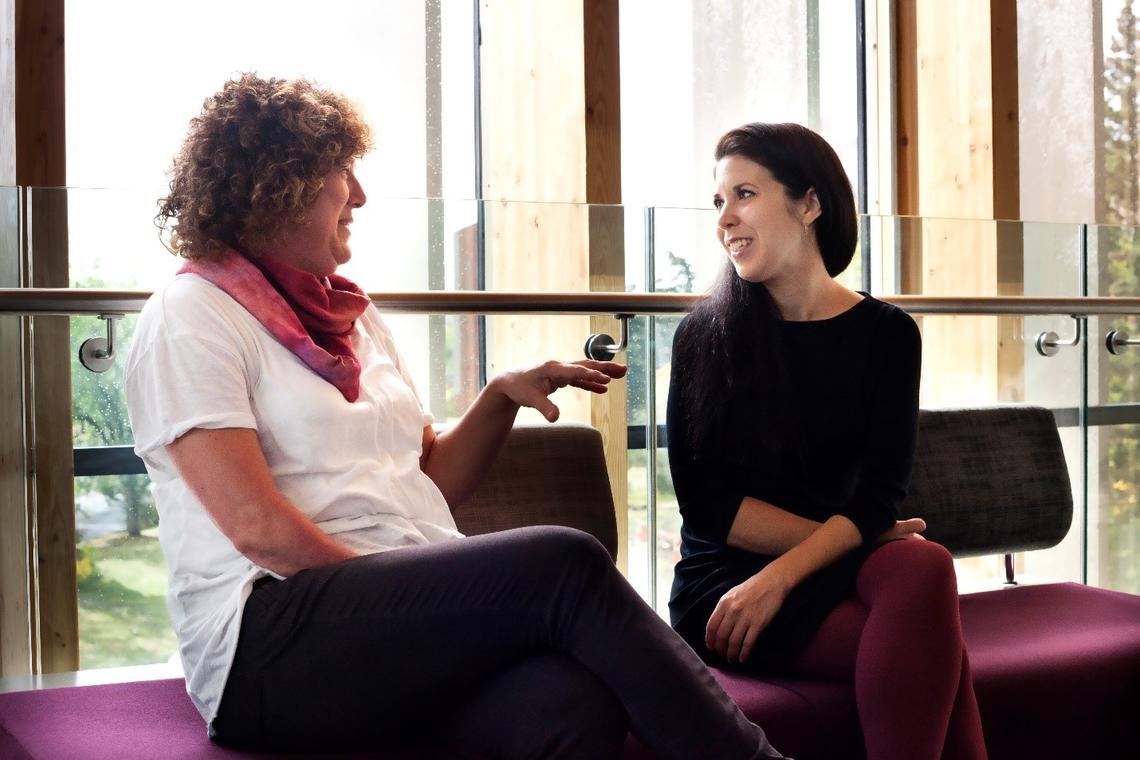
The Teaching Academy’s Peer-to-Peer Mentorship program offers one-on-one support to UCalgary faculty
Jessica Snow, Taylor Institute for Teaching and Learning
Sept. 19, 2018

The Teaching Academy’s Peer-to-Peer Mentorship program offers one-on-one support to UCalgary faculty
Jessica Snow, Taylor Institute for Teaching and Learning
Sometimes teaching can be a lonely practice. Many instructors walk into their lecture theatres prepared to confront rows of unfamiliar faces. Even more certainly, they now expect to see glowing screens — laptops, tablets and the increasingly unavoidable presence of smartphones. As the world continually changes and technology evolves in tandem, many instructors might find themselves wondering if there is another way to approach teaching. Is there another way? Perhaps even a better way?
Whether instructors prefer traditional lecture styles or more unconventional approaches to classroom learning, the practice of knowledge-building requires exchange. Not only does instruction require the presence of students, but teachers also often communicate with one another to share anecdotes, experiences, tips and ideas to enrich their approaches.
These conversations can be formal, voiced during Q-and-A sessions at workshops and conferences, or they can be informal — emotionally charged conversations over coffee or deeply reflective discussions between close peers. Such exchanges are exemplified by the Peer-to-Peer Mentorship Program, offered by the Teaching Academy (a community of instructors who have received University of Calgary Teaching Awards).
Dr. Isabelle Barrette-Ng, PhD, a senior instructor in the Department of Biological Sciences, was part of the inaugural group of Teaching Academy members. During her own experience as a peer mentor, she found exciting opportunities for community-building with other instructors.
“Sharing knowledge among peers helped to create a supportive network of individuals with expertise and distinct experiences in different disciplines, but who also shared many common challenges,” she says. “I learned many new approaches to solving problems in my own practice and was able to help share ideas that I hope were helpful to others facing similar challenges.”
Mentorship fosters shared knowledge and solutions
Dr. Lisa Stowe, PhD, a senior instructor in the Department of Communication, Media and Film, felt similarly about her mentorship when she offered support to Dr. Morgan Vanek, PhD, an assistant professor in the Department of English. (above)
“Any conversation you can have with colleagues about their teaching experience, challenges and rewards is useful because chances are you’ve also experienced the same things, and knowing that helps,” she considers. “Seeing and hearing about how others approach the classroom gives you ideas and solutions you might not have thought of on your own. Also, sharing knowledge makes the teaching intentional, and any time you can relate assignments and assessments with intentionality is a good thing.”
Vanek originally sought out the Peer-to-Peer Mentorship Program with questions about experiential learning and team teaching. She was eventually matched up with both Stowe and Dr. Tracey Clancy, PhD, from the Faculty of Nursing.
Seeking support from colleagues in the face of evolving learning environments
“I am very grateful to both Lisa and Tracey for all of the ways that they helped me think through how a course can help students develop a sense of responsibility for their own learning, and I especially appreciated our conversations about how to design assignments that introduce students to the wide range of resources that they have — within the classroom, but also outside of it — to pursue further research on the questions that interest them most,” Vanek notes.
Ultimately, she believes transformative educational practice requires adjusting to the evolving landscape of our learning environments and the world at large.
“In many ways, our classrooms are changing all the time, and that’s a good thing — because it means that our courses and teaching practices need to change, too,” she explains. “At the same time, though, none of us will be the first person to try to share a complex idea with a diverse audience, always feeling like there’s not quite enough time to get to everything — and so if there’s something that someone else in a different department, different field or different teaching context has tried that has worked, even for a short period of time or for a single set of ideas, any chance to learn more is also a chance to become a better teacher.”
Her mentor Stowe echoes this sentiment, citing the value of her cross-disciplinary collaboration with Vanek. Taking into consideration her own background in communication, media and film and Vanek’s experience with the study of English literature, Stowe notes the surprising amount of overlap in their practices.
“The disciplines are different, but how we approach the classroom is similar, and it was fun to come up with assignments and assessment strategies that transcended the disciplines,” she says. “We problem-solved and collaborated to create more experiential learning activities and assessments, and though my mentee was developing experiential learning activities of this sort for the first time, I was tweaking and making my already established techniques more effective. It was very rewarding for me to approach my assignments and assessments from another perspective, and I learned a ton about why I was organizing my course a certain way.”
The Teaching Academy’s Peer-to-Peer Mentorship Program is designed to support University of Calgary teachers at all career stages. The program seeks to encourage instructors to ask critical questions about their teaching, locate resources to address those questions, and communicate their teaching plans and progress.
The actions our faculty and staff take every day, at work or in the community, contribute to UCalgary’s success and our one university family culture. Celebrate UCalgary’s achievements at the 2018 Community Report event on Sept. 26. RVSP today.